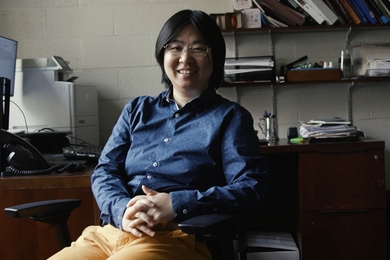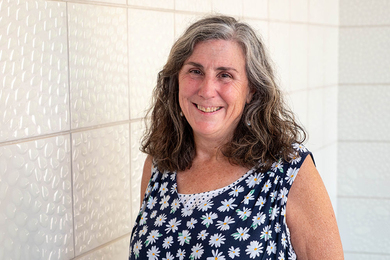The Media Lab has always been a place for students and researchers to work on building the future they want to live in. As such, many innovative companies have spun out of its multidisciplinary working spaces. Since 2013, however, the lab has taken a more deliberate approach to helping entrepreneurs create successful companies, with the E14 Fund.
The fund is designed to supercharge the Media Lab’s impact in the world by supporting the imaginative people that have walked its hallways. That support can come in the form of early-stage investments and fellowships that give students, alumni, and researchers a “runway” to turn their ideas into businesses. But E14 — named after the location of the Media Lab building — is much more than an investment fund.
“Even though the E14 Fund has the word ‘fund’ at the end of it, first and foremost we’re a community-builder,” Managing Partner Habib Haddad says. “When you put that first, you actually become a stronger venture fund by being an authentic community supporter.”
Haddad, fellow Managing Partner Calvin Chin, and their team of venture partners and advisors believe their efforts help turn the innovative ideas of the Media Lab’s community into companies that benefit society.
“I helped launch [E14] because I felt it addressed an important need in offering a runway to graduating students who wanted to deploy their research through a new company, and it's been successful at doing that,” Media Lab Director Joi Ito says. “But it's also become a really good community and a networking hub for Media Lab students, researchers, and alumni — not just ones working on building a company.”
A bold founding mission
The Media Lab is known for fostering a culture that blends future-focused research with current problems to inspire creative solutions. The lab’s community has also developed a reputation for pursuing bold, new ideas at rapid — some might say entrepreneurial — speed.
Throughout 2013, Ito was looking for a way to help students continue following the Media Lab’s “deploy” mantra after graduation. Ito believed a venture fund, if structured correctly, could increase the Media Lab’s impact on the world while also furthering its academic mission, by helping students focus on their coursework without worrying about losing support when they graduate.
In keeping with the lab’s experimental ethos, E14 began as what Haddad calls a “prototype fund” of $2 million in 2013. The money was used to provide both equity and nonequity funding and mentoring to recent graduates in the early stages of starting companies. Some of the carried interest from the fund would be donated back to MIT to support more research at the Media Lab (a practice that carries on today).
A handful of the earliest investments went on to raise much larger funding rounds and find commercial success, including the manufacturing app platform Tulip, robotic furniture company Ori, and urban technology company Soofa. With an eye toward building a community, E14 also provided slightly later-stage funding to Media Lab spinouts Formlabs and Affectiva.
Even as the early investments had success, it became clear the Media Lab would benefit from an even more involved investment team. E14’s next fund, launched at the end of 2017, raised $37 million.
“As that prototype fund was evolving, it turned out some of these companies needed much more capital and support,” Haddad recalls. “We said, ‘These are all great companies, but for each one, there’s a few others that could have been great spinoffs that didn’t have the right funding or support.’”
Since then, the E14 Fund has been advising everyone from Media Lab alumni starting their fourth company to current students nearing graduation. It’s also helped the lab’s member companies connect with researchers and created a more active community overall.
A pillar in the community
Today the E14 team regularly hosts events and gatherings for members of the Media Lab. The lab’s semiannual member week now includes a startup showcase, and alumni are becoming a more common sight in the hallways.
E14 also works with the other entrepreneurial resources on campus, giving students advice on what programs are worth exploring depending on what stage their idea is in.
The E14’s average funding is between $500,000 and $1 million, while its fellowship program offers a lower-risk way of pursuing the commercialization of an idea. Some of E14’s latest investments include ThruWave, a company using millimeter wave sensors to see through packaging; Figur8, which has developed a system that captures three-dimensional skeletal movement and muscle output; Wise Systems, which uses fleet dispatch and routing software to optimize deliveries; Canopy, which uses machine learning to preserve privacy on the internet; and Kiwi, which offers a robotic cropdusting system for distributing chemicals and seeds on precise plots of land.
By investing exclusively in Media Lab founders with a new technology, the E14 team spends far more time with founders — sometimes years, as students work toward graduation or alumni consider starting companies — compared to traditional investment funds, and helps researchers and scientists develop a more entrepreneurial mindset over time.
“We like to say we don’t have all the answers, but we ask a lot of questions,” Chin says. “It’s really just brainstorming and thinking about the kind of company they’re going to build, the way they’re going to build it, and the market they’re going to address. A lot of times in that process we’ll be making introductions. We’re trying to add value even if we’re not invested.”
In fact, beyond making investments, the E14 Fund bears little resemblance to other venture capital funds, in which partners typically guard their time like gold and focus on narrow areas of industries. The members of E14, conversely, say their areas of investment are entirely dependent on the interests of members of the Media Lab.
“Our model is serving the community, and then finding companies as a subset of that community,” Chin says. “We just always want to be listening to the community. If the community’s research interests or business interests go a certain way, we want to be there with the resources the community needs. That’s what we’re excited about going forward.”











